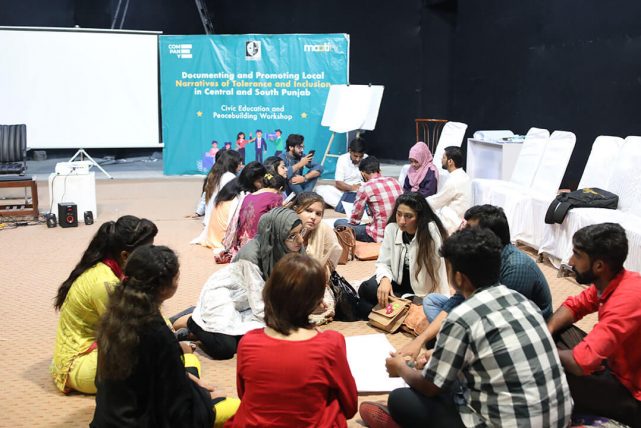This project aimed to provide a counter narrative to violent extremism through the use of citizen journalism and documentary film, with the goal of promoting peace, tolerance, and cultural heritage. A total of 200 students from Islamia University Bahawalpur and Bahauddin Zakariya University in Multan were oriented in peaceful coexistence and human rights, followed by training in citizen journalism. Out of this group, 40 students received more extensive training in documentary film production, resulting in the creation of 20 short films covering topics such as women’s empowerment and interfaith harmony. These films were disseminated in southern Punjab through film festivals.
IRC partnered with the United States Institute for Peace (USIP), in 2015, to develop 3 theatre plays on interfaith harmony and peaceful co-existence with community groups consisting of both Christian and Hindu minorities. This was followed by 30 community performances in front of a mixed minority crowd in Lahore, Multan and Bahawalnagar.
The interfaith harmony campaign, in collaboration with Church World Service (CWS), aimed to promote peaceful coexistence and interfaith community development by engaging 2500 religious leaders from different faiths. IRC worked to form peace committees and provide a platform for young religious leaders to initiate interfaith dialogue within their communities. Radio programs were organised and aired in cities throughout Sindh and Punjab, where local issues such as safe drinking water and education were discussed in the context of religious coexistence among various religious leaders.
In 2009, IRC initiated a campaign against Talibanization in Pakistan through the production of plays on the topic. The plays, including “Yeh Taliban Kon Hain,” were performed for diverse audiences in various cities with the goal of raising awareness about the issue and advocating for peace. The National Forum, held in Lahore, aimed to increase awareness about religious fundamentalism and its consequences, and included a theatre performance that exposed the Taliban’s actions of humiliating and terrifying people in their daily lives. The campaign also included the production of a documentary called “Burning Paradise.”



